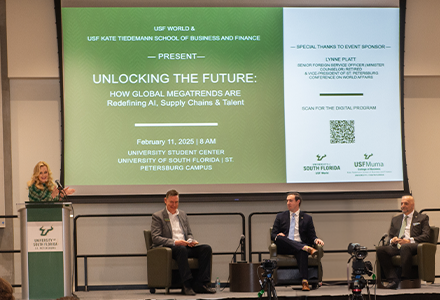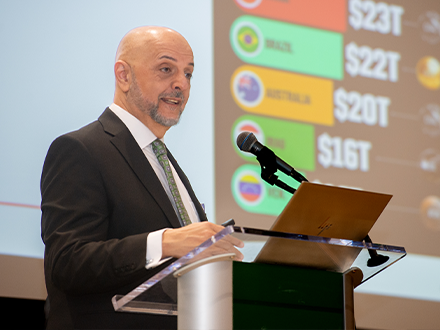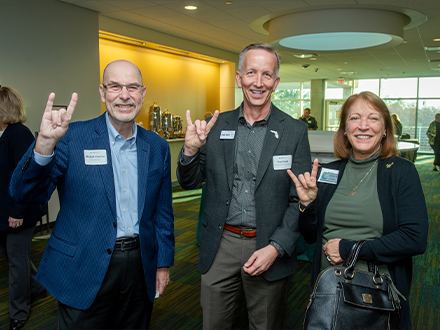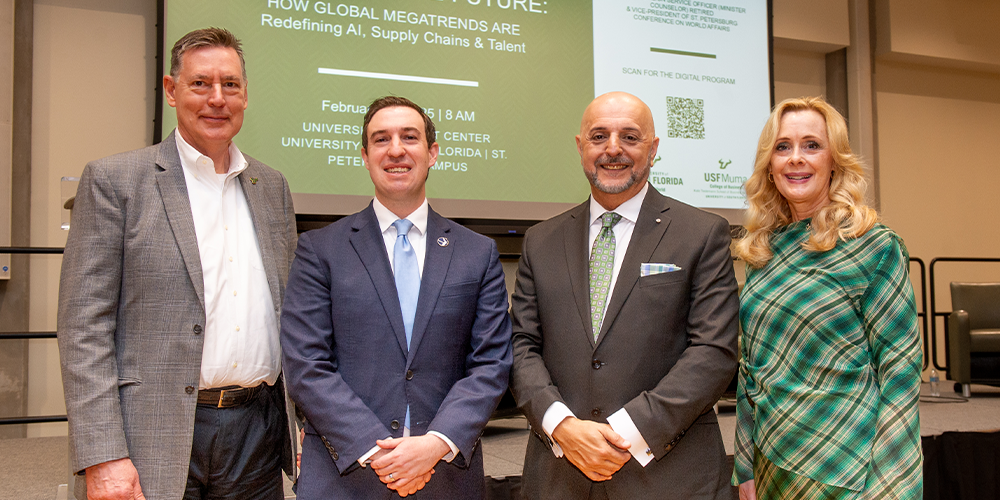
Trade wars, the race for AI dominance and workforce issues may be dominating the headlines and news alerts, but what really shapes those issues and economies, from a local to global scale, are the “megatrends” that take decades to unfold, says John Pournoor, the founder of the global data firm Government Analytica.
What this means for Florida — and for the University of South Florida as it works to prepare students for success in the economy of the future — is the ability to read and understand emerging trends and how they create opportunities, says Jason Mahon, Deputy Secretary of Economic Development at FloridaCommerce.
The two experts dissected those three megatrends in a recent gathering at the University of South Florida St. Petersburg sponsored by USF World, uncovering new insights into Florida’s growing prominence in the global economy. The questions weren’t asked in abstract: If Florida was its own country, data from the Florida Chamber of Commerce indicates it would be the equivalent of the world’s 16th largest economy with the potential to become the 10th largest within a decade.
That’s why scores of Tampa Bay area business leaders, government officials and USF community members turned out to hear Pournoor, the founder and CEO of the Minneapolis-based data analytics firm Government Analytica, explain the waves of global change and why those changes matter here.

Some of the megatrends dominating the headlines include innovation, geopolitical shifts,
environmental sustainability, demographic trends and workforce transformation. Megatrends
also tend to influence each other’s trajectory – which is why addressing global issues
can be complex and seemingly intractable.
“We think the future is far away. The future is actually here,” Pournoor said. “It’s
just not evenly distributed in every state (or) at the same level in every part of
the country.”
Megatrends, Pournoor explained, are shifts that play out over decades or longer — such as urbanization or the global integration of economies through trade or technological advances, such as AI. Government Analytica, which provides analysis for some of the largest corporations and other entities in the world, recently released its 2025 edition of The Top 12 Geopolitical Megatrends.
As a high-growth state, Florida’s emphasis on economic development, building a talent pipeline and working to expand manufacturing – particularly in high-tech advanced manufacturing – is what’s helping position the state to be competitive on a global scale, Mahon said.
“When you look at what’s the source of our growth, the source of our workforce advantages here in Florida, it’s very important we take advantage of this moment,” Mahon said.
Florida also has carved out a place for itself to be a leader in supply chain dynamics. With the Southeast leading the nation in growth, Florida’s logistics capacity is expanding with its thriving ports and airports and the post-pandemic “nearshoring” and “reshoring” trends that see more manufacturing relocating from China to North and Central America.
“When you look at what’s the source of our growth, the source of our workforce advantages here in Florida, it’s very important we take advantage of this moment,” Mahon said. “How are we going to grow? How are we going to respond to these megatrends?
“… You need the workforce first, otherwise no industry, no company is going to say that they are going to want to be where you are. We have said we are going to build this workforce that is skilled in these high-tech fields, high-tech industries. We’re going to invest in them. Over time, we are confident that our local companies are going to be able to grow and that people coming here are going to be able to invest in our state because we have that available workforce.”
The Big Questions: AI and Future Work
Asked by Kate Tiedemann School of Business and Finance Dean Gary Patterson about how AI will change the economy in the Tampa Bay Region, both Mahon and Pournoor said the technology is already transforming the way some people work. The time to make larger talent pipeline adjustments for an AI-driven workforce is already underway, they agreed.
“In Florida we are certainly going to see over time a lot of folks impacted by AI, that doesn’t mean they are going to lose their job to it,” Mahon said. “It means they are going to need to know how to use it and to interface with it. That’s a really important skill we are seeing already.”
Pournoor added: “Every time we have had a technological transition, it has affected a certain cross section of the workforce and we need to deal with these transitions with a great deal of empathy and support for the people who are affected.
 (left to right) Ralph Garcia, founder of Ralph Garcia Advisory, Florida High Tech
Corridor CEO Paul Sohl and Dee Garcia, director of development & strategic partnerships
at Tampa Bay Wave were among the community leaders from across the region who joined
the event.
(left to right) Ralph Garcia, founder of Ralph Garcia Advisory, Florida High Tech
Corridor CEO Paul Sohl and Dee Garcia, director of development & strategic partnerships
at Tampa Bay Wave were among the community leaders from across the region who joined
the event. “… Florida is a very pro-growth state and therefore welcomes these innovations. I encourage you to think about that while we chase the excitement of AI, we also need to be cognizant of the fact that workforce training and other types of things are going to be required. Universities are great places to be reskilling people. Our skillsets that we walk away from college with become obsolete very quickly, so we must be in that state of continuous learning.”
Patterson shared with the audience that USF is embedding AI into its curriculum so that students become informed users of the technology and bring those skillsets into the workforce. USF is also launching a new College of Artificial Intelligence, Cybersecurity and Computing later this year.
Mahon pointed out that most of the businesses in Florida are small businesses, and combined they employ half the population. “There are a ton of innovators in Florida that are coming out of our universities,” he added. “… We've done a lot to attract that more resilient economy. Now we need to make sure small businesses are what we're really looking for the future because they are going to define our success.”
For now, the waves of change seem to be trending Florida’s way, Pournoor said.
“If you look at how the GDP of the states are growing, Florida, Texas and a couple of others are dramatically outpacing the remaining states in the union,” he said. “I think there is, there's something to be said about the consistent decade after decade investments that all of you have made in Florida to make it what it's today.”
You may view photos from the event here.
